january-top.html
1845 Kitty O’Shea was born on this day in 1845 in Essex, England. She married Irish MP, Captain William O’Shea, but began a relationship with the leading politician in Ireland at the time, Charles Parnell.
When their relationship was exposed, Parnell’s career was left in tatters.
Click here to read more about Parnell and O’Shea
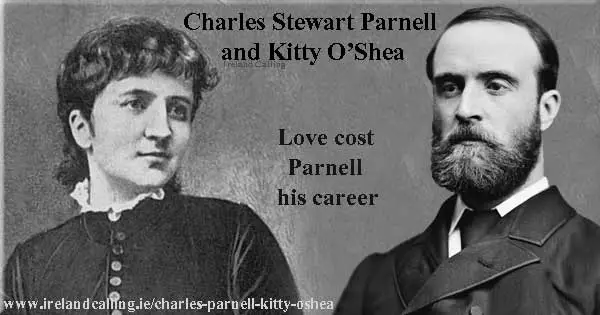 * * *
* * *
1864 The National Gallery of Ireland opened its doors for the first time on this day in 1864 in Dublin. Visitors can now view works by numerous great Irish artists, as well as some of the biggest names of the last century, including Monet and Rembrandt.
One of Ireland’s favourite paintings is housed in the National Gallery – Augustus Nicholas Burke’s Connemara Girl.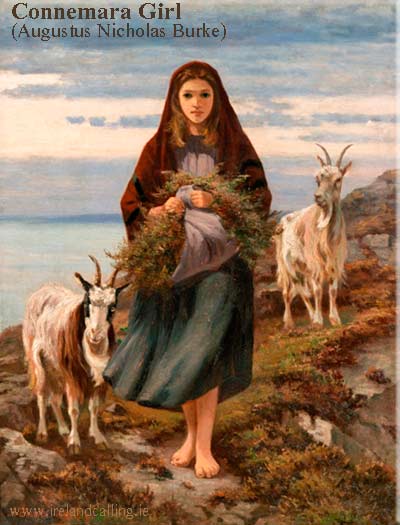
The Gallery has about 14,000 works of art, including about 2,500 oil paintings, 5,000 drawings, 5,000 prints and some sculpture and furniture.
Click here to read more about Dublin’s top tourist attractions
Click here to read more about Irish art
* * *
1947 James Larkin died. He founded the Irish Citizen Army (a group of trade union volunteers). This is one of his most famous quotes, which still resonate with millions of people today.
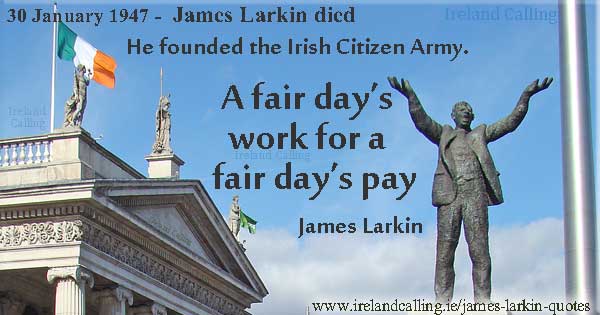
Read more about James Larkin (often known as Big Jim) here.
Read Larkin’s memorable quotes here.
* * *
1950 Happy birthday to Paddy Keenan, born 30 January in 1950. Keenan is a talented musician who plays the uilleann pipes. He was a founding member of The Bothy Band and rose to fame in the 1970’s.
Since the band broke up, Keenan has worked as a solo artist and also collaborated with singer/guitarist Tommy O’Sullivan.
* * *
1972 On this day in Derry in 1972, a planned march by The Northern Ireland Civil Rights Association (NICRA) ended in tragedy, as confusion within the British army led to panic and they opened fire on the crowds, leaving 14 people dead.
Tensions were high before and during the march. Several British army soldiers had been killed by the IRA in the previous months. There was a ban on all marches due to the hostile mood and the high potential that they could break out into riots.
Upon hearing about NICRA planned march, the government decided to let it go ahead in the Catholic areas of the city, but prevent the march reaching Guildhall Square. The British army were sent in to control the flow of the crowds.
When the crowd reached Guildhall Square, some youths attempted to break down the barricade put in place by the army. They were dispersed with tear gas and rubber bullets. A message passed through the British soldiers that there was an IRA sniper at work, causing them to panic. They were given the order to use live rounds to disperse the crowd and opened fire. A mass panic followed as the crowd tried to flee but several civilians and protestors were killed. The day became known as ‘Bloody Sunday’.
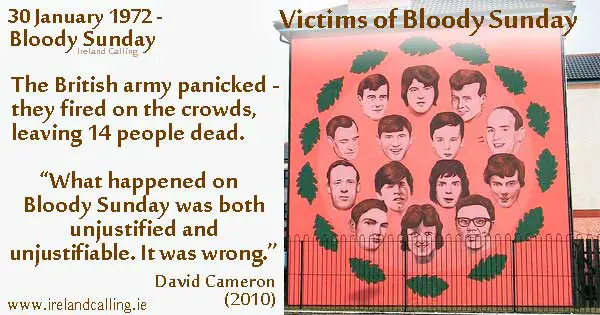
In the aftermath of the events, the British army claimed they had returned fire after being attacked with guns and nail bombs by the IRA. Eye witness accounts from journalists, civilians and protestors say that the army were not under attack, but that they opened fire on the crowd, shooting many as they were running away or tending to the wounded.
An investigation into the actions of the British army was launched by the British government but the report backed up the claims of the British soldiers, that they were retaliating after being attacked.
Relations between England and Ireland reached an all-time low and the British embassy building on Merrion Square, Dublin was burned down.
A second enquiry into Bloody Sunday was commissioned by British Prime Minister Tony Blair in 1998. Lord Saville, a Supreme Court judge, spent 12 years investigating the events before releasing his findings in 2010.
Prime Minister David Cameron spoke in the House of Commons about the Lord Saville report:
“I am deeply patriotic. I never want to call into question the behaviour of our soldiers and our army, But the conclusions of this report are absolutely clear. There is no doubt. What happened on Bloody Sunday was both unjustified and unjustifiable. It was wrong.”
* * *
1984 Luke Kelly tragically died on this day in 1984 from a brain tumour. Kelly was one of the founding members of the legendary folk band, The Dubliners.
Kelly helped to make Patrick Kavanagh’s poem Raglan Road into a regular song on the folk circuit.
His bandmate Ronnie Drew spoke about his friend after his funeral:
“He had a huge funeral in Dublin—television and radio and all the papers. In fact, there were so many there they had to get police on motorbikes. Luke would have had a laugh because he used to have run-ins with the police. They were all there – politicians from both sides of the divide. It was a terrible loss.”
Click here to watch a video of Luke Kelly performing Raglan Road
Click here to read more about Luke Kelly
Click here to read more about the Dubliners
Click here to read more on Patrick Kavanagh
Click here to read Raglan Road and notes and analysis on the poem
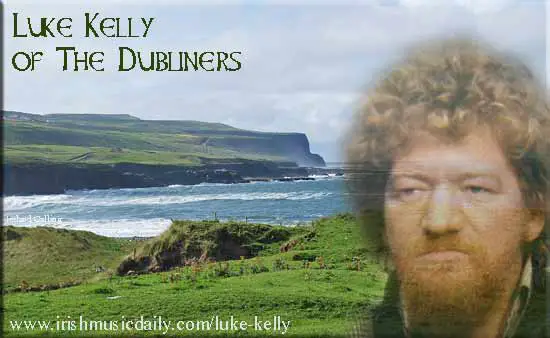
* * *
1987 Happy birthday to Becky Lynch, born in Dublin on this day in 1987. She is a professional wrestler and won the ECCW Women’s Championship and the Queen of Chaos title under the name Rebecca Knox, before she joined the WWE in 2013.
january-bottom.html